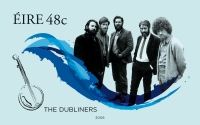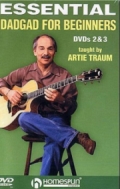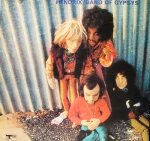Lives
[by Ken Hunt, London] You could hardly find a more thoroughly Swiss or Swiss-German gentleman than the folk musician Rudolf ‘Ruedi’ Rymann who died on 10 September at his home in Giswil in the Swiss Canton of Obwalden. In the public eye he was a musician and sportsman and by trade he was a farmer and cheese-maker. In retirement he was also a huntsman. He epitomised Swissness.
11. 10. 2008 |
read more...
[by Ken Hunt, London] The Guinean saxophonist and clarinettist, gravely voiced singer and songwriter, Momo ‘Wandel’ Soumah died in his homeland’s capital, Conakry on 16 June 2003. Of Baga tribal stock, he survived the, at times, perilous crossing from colonial times (exemplified by stints in dance bands with names redolent of the period such as La Joviale Symphonie and La Douce Parisette) to independence. During the socialist years of Sékou Touré’s presidency, an Afro-centric sound was de rigueur.
11. 10. 2008 |
read more...
 [by Ken Hunt, London] In November 2006 An Post – Eire’s Post Office – issued a set of four commemorative stamps with portraits of The Clancy Brothers with Tommy Makem, The Dubliners, The Chieftains and Altan on them. Each group added something special to Ireland’s appreciation of its own musical heritage and in turn to the wider world’s appreciation of Irish music. But there was never a folk band to compare to the Dubliners – the Chieftains were quite different – and in his prime Ronnie Drew’s voice was contender for the most distinctive in Irish music.
[by Ken Hunt, London] In November 2006 An Post – Eire’s Post Office – issued a set of four commemorative stamps with portraits of The Clancy Brothers with Tommy Makem, The Dubliners, The Chieftains and Altan on them. Each group added something special to Ireland’s appreciation of its own musical heritage and in turn to the wider world’s appreciation of Irish music. But there was never a folk band to compare to the Dubliners – the Chieftains were quite different – and in his prime Ronnie Drew’s voice was contender for the most distinctive in Irish music.
2. 9. 2008 |
read more...
 [by Ken Hunt, London] At the beginning of the 1960s a new kind of folk scene started to develop in the USA. Overall, the scene consisted very much of localised affairs. In Colorado, Boulder was separate from Denver. The US East Coast scene, notably based around Boston and Cambridge in Massachusetts and New York operated independently of each other. Gradually they made contacts and connections. The dots joined up. Some New York musicians such as David Grisman and Jody Stecher relocated to California, for example. Artie Traum was part of the New York scene but by the late 1960s he was part of the bigger picture.
[by Ken Hunt, London] At the beginning of the 1960s a new kind of folk scene started to develop in the USA. Overall, the scene consisted very much of localised affairs. In Colorado, Boulder was separate from Denver. The US East Coast scene, notably based around Boston and Cambridge in Massachusetts and New York operated independently of each other. Gradually they made contacts and connections. The dots joined up. Some New York musicians such as David Grisman and Jody Stecher relocated to California, for example. Artie Traum was part of the New York scene but by the late 1960s he was part of the bigger picture.
15. 8. 2008 |
read more...
 [by Ken Hunt, London] Peter Kameron was a man who straddled many fields of the arts and entertainment. He was born in New York City on 18 March 1921 and went on to become the personal manager for a number of US music acts in the 1950s and the 1960s, signally amongst them, the Weavers and the Modern Jazz Quartet.
[by Ken Hunt, London] Peter Kameron was a man who straddled many fields of the arts and entertainment. He was born in New York City on 18 March 1921 and went on to become the personal manager for a number of US music acts in the 1950s and the 1960s, signally amongst them, the Weavers and the Modern Jazz Quartet.
He broadened his approach and built on his expertise and experience to become part of the management team around The Who. They were a rather promising rock group whose Pete Townshend nevertheless made no bones about pitching songs to the folk scene to.
19. 7. 2008 |
read more...
 [by Ken Hunt, London] San Francisco’s graphic artist, painter and poster and collage artist, Alton Kelley died at his home in Petaluma, California on 1 June 2008 at the age of 67. It would be hard to over-estimate him as one of San Francisco’s foremost psychedelic artists and his impact on that scene’s rock music in visual and graphic terms. He was central to that blossoming of great handbill, poster and album art that people associate with San Francisco.
[by Ken Hunt, London] San Francisco’s graphic artist, painter and poster and collage artist, Alton Kelley died at his home in Petaluma, California on 1 June 2008 at the age of 67. It would be hard to over-estimate him as one of San Francisco’s foremost psychedelic artists and his impact on that scene’s rock music in visual and graphic terms. He was central to that blossoming of great handbill, poster and album art that people associate with San Francisco.
14. 6. 2008 |
read more...
[by Ken Hunt, London] The Kirana gharana – or school of playing – seated in Kirana, near Saharanpur in India’s state of Uttar Pradesh, is one of the major styles of performance in Hindustani music. Kirana is particularly noted for the quality of its vocalists. Historically, it was associated with great maestros such as Abdul Karim Khan and Sawai Gandharva. In more recent times it was associated with singers who carried the torch on such as Bhimsen Joshi…
12. 5. 2008 |
read more...
 [by Ken Hunt, London] Like Ron Edwards (1930-2008), the Australian folklorist and folk recordist, folk journalist and archivist Edgar Waters was a pioneer in the field of Australian folksong and folklore. In 1947 he co-authored Rebel Songs with Stephen Murray-Smith, a booklet for the A.S.L.F. – a slim volume similar to the Workers’ Music Association booklets that were being published in Britain.
[by Ken Hunt, London] Like Ron Edwards (1930-2008), the Australian folklorist and folk recordist, folk journalist and archivist Edgar Waters was a pioneer in the field of Australian folksong and folklore. In 1947 he co-authored Rebel Songs with Stephen Murray-Smith, a booklet for the A.S.L.F. – a slim volume similar to the Workers’ Music Association booklets that were being published in Britain.
8. 5. 2008 |
read more...
[by Ken Hunt, London] The sitarist, composer and teacher Shashi Mohan Bhatt began what might be called a family tradition: that of taking Pandit Ravi Shankar as their guru. His son Krishna Mohan Bhatt and his sister Manju Mehta (her married name) – both of whom played sitar – and his younger brother Vishwa Mohan Bhatt – who played a modified acoustic guitar he named Mohan vina player – would all go on to study with the sitar maestro Ravi Shankar. Shashi Mohan Bhatt, however, was one of Shankar’s first shishyas (pupil-disciples). Nobody was quite sure, least of all Ravi Shankar, but Shashi Mohan Bhatt was definitely one of the first three.
4. 5. 2008 |
read more...
[by Ken Hunt, London] On 15 April 2008 Mahinarangi Tocker, the Maori musician, songwriter, feminist, gay and lesbian rights activist and political campaigner, died in Auckland, New Zealand. She was one of New Zealand’s most conspicuous song-makers and bore comparison with Joan Armatrading and Tracy Chapman. Born in 1956, she was of mixed bloodlines. She was of Ngati Maniapoto, Ngati Raukawa and Ngati Tuwharetoa – Ngati is a Maori tribal prefix -, Jewish and European stock, hence the title of one of her albums…
19. 4. 2008 |
read more...
« Later articles
Older articles »
 [by Ken Hunt, London] In November 2006 An Post – Eire’s Post Office – issued a set of four commemorative stamps with portraits of The Clancy Brothers with Tommy Makem, The Dubliners, The Chieftains and Altan on them. Each group added something special to Ireland’s appreciation of its own musical heritage and in turn to the wider world’s appreciation of Irish music. But there was never a folk band to compare to the Dubliners – the Chieftains were quite different – and in his prime Ronnie Drew’s voice was contender for the most distinctive in Irish music.
[by Ken Hunt, London] In November 2006 An Post – Eire’s Post Office – issued a set of four commemorative stamps with portraits of The Clancy Brothers with Tommy Makem, The Dubliners, The Chieftains and Altan on them. Each group added something special to Ireland’s appreciation of its own musical heritage and in turn to the wider world’s appreciation of Irish music. But there was never a folk band to compare to the Dubliners – the Chieftains were quite different – and in his prime Ronnie Drew’s voice was contender for the most distinctive in Irish music. [by Ken Hunt, London] At the beginning of the 1960s a new kind of folk scene started to develop in the USA. Overall, the scene consisted very much of localised affairs. In Colorado, Boulder was separate from Denver. The US East Coast scene, notably based around Boston and Cambridge in Massachusetts and New York operated independently of each other. Gradually they made contacts and connections. The dots joined up. Some New York musicians such as David Grisman and Jody Stecher relocated to California, for example. Artie Traum was part of the New York scene but by the late 1960s he was part of the bigger picture.
[by Ken Hunt, London] At the beginning of the 1960s a new kind of folk scene started to develop in the USA. Overall, the scene consisted very much of localised affairs. In Colorado, Boulder was separate from Denver. The US East Coast scene, notably based around Boston and Cambridge in Massachusetts and New York operated independently of each other. Gradually they made contacts and connections. The dots joined up. Some New York musicians such as David Grisman and Jody Stecher relocated to California, for example. Artie Traum was part of the New York scene but by the late 1960s he was part of the bigger picture. [by Ken Hunt, London] Peter Kameron was a man who straddled many fields of the arts and entertainment. He was born in New York City on 18 March 1921 and went on to become the personal manager for a number of US music acts in the 1950s and the 1960s, signally amongst them, the Weavers and the Modern Jazz Quartet.
[by Ken Hunt, London] Peter Kameron was a man who straddled many fields of the arts and entertainment. He was born in New York City on 18 March 1921 and went on to become the personal manager for a number of US music acts in the 1950s and the 1960s, signally amongst them, the Weavers and the Modern Jazz Quartet. [by Ken Hunt, London] San Francisco’s graphic artist, painter and poster and collage artist, Alton Kelley died at his home in Petaluma, California on 1 June 2008 at the age of 67. It would be hard to over-estimate him as one of San Francisco’s foremost psychedelic artists and his impact on that scene’s rock music in visual and graphic terms. He was central to that blossoming of great handbill, poster and album art that people associate with San Francisco.
[by Ken Hunt, London] San Francisco’s graphic artist, painter and poster and collage artist, Alton Kelley died at his home in Petaluma, California on 1 June 2008 at the age of 67. It would be hard to over-estimate him as one of San Francisco’s foremost psychedelic artists and his impact on that scene’s rock music in visual and graphic terms. He was central to that blossoming of great handbill, poster and album art that people associate with San Francisco. [by Ken Hunt, London] Like Ron Edwards (1930-2008), the Australian folklorist and folk recordist, folk journalist and archivist Edgar Waters was a pioneer in the field of Australian folksong and folklore. In 1947 he co-authored Rebel Songs with Stephen Murray-Smith, a booklet for the A.S.L.F. – a slim volume similar to the Workers’ Music Association booklets that were being published in Britain.
[by Ken Hunt, London] Like Ron Edwards (1930-2008), the Australian folklorist and folk recordist, folk journalist and archivist Edgar Waters was a pioneer in the field of Australian folksong and folklore. In 1947 he co-authored Rebel Songs with Stephen Murray-Smith, a booklet for the A.S.L.F. – a slim volume similar to the Workers’ Music Association booklets that were being published in Britain.